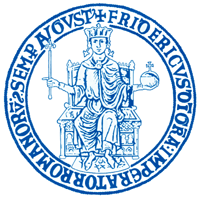Location
The University of Naples Federico II (Italian: Università degli Studi di Napoli Federico II) is a university located in Naples, Italy. Founded in 1224 it is the oldest public non-religious university in the world, and is now organized in 13 faculties. It was Europe's first university dedicated to training secular administrative staff, and one of the oldest academic institutions in continuous operation. Federico II is the third University in Italy by number of students enrolled, despite its huge dimensions it still represents one of the best Universities in Italy being an excellence in particular for research; in 2015 it was ranked among the first 100 universities in the world by citations per paper.] As of 2016 it is the only generalist Italian university in the Times higher education reputation, which considers the best 200 best universities in the world. The university is named after its founder Frederick II. From October 2016 the University hosts the first ever Apple IOS Developer Academy.
Source: Wikipedia (consulted d.d. February 21st 2018)
Members:
Resources
Displaying 21 - 25 of 56Assessment on the Expansion of Basic Sanitation Infrastructure. In the Metropolitan Area of Belo Horizonte - 2000/2010
The Metropolitan Area of Belo Horizonte is consisted of 34 municipalities, however approximately 79,68% of its population is concentrated at the conurbation zone with 19 municipalities. This zone presented different expansion axis (North, South, West) throughout the time. This article intends to assess the investments made in basic sanitation infrastructure (access to water supply, sewage collection network and garbage collection service) within the period from the years 2000 to 2010. For this purpose, land cover maps for these years were created to identify the new urban expansion axis.
The Energy Networks Landscape. Impacts on Rural Land in the Molise Region
The paper concerns the study of the energy infrastructure that have the most impact on rural land. The analysis focuses on the systems for wind power and ground–mounted photovoltaic plants.
Designing Mobility in a City in Transition. Challenges from the Case of Palermo
Transport policy is one of the most crucial sectors in the process of adaptation of contemporary cities to the challenge of sustainable development. For its close relation with social habits and people behaviors, in fact, innovation in transports play a strategic role both in the decreasing of the environmental impact of mobility and in the improvement of the quality of the built environment. To do so, however, cities need to reach a more effective integration between transport policy and land-use planning, as well as taking full advantage by the spreading of new technologies.
The Factors Influencing Transport Energy Consumption in Urban Areas: a Review
Transport energy consumption accounts for about one third of total energy consumption in EU. Despite significant advances in transport technology and fuel formulation, transport energy consumption has increased in most EU countries over the last three decades. This increase in consumption occurred as a result of factors such as higher car ownership, a growth in automobile use and an increase in vehicle distances traveled.
Piano dei Servizi. Proposal for Contents and Guideline
As an endless melting pot of experimentation and innovation, cities must reorganize and retrain compared to the growing new needs. In the light of the actual urban debate, it can be useful to do an in-depth study. In fact, the quality of urban life and collective well-being cannot be separated from the identification of a network of public services and facilities, that organizes and structures the city. That network is not resolved in the themes of pre-school and compulsory education, public interest, green spaces, car parks and public interest, but rather has a wider variety of types.


